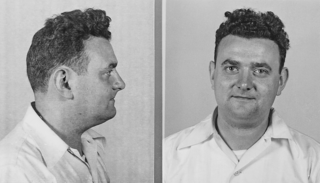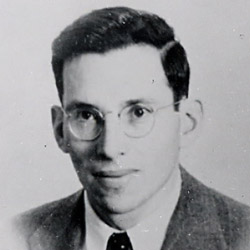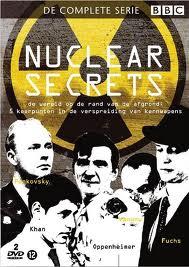
Klaus Emil Julius Fuchs was a German theoretical physicist and atomic spy who supplied information from the American, British, and Canadian Manhattan Project to the Soviet Union during and shortly after World War II. While at the Los Alamos National Laboratory, Fuchs was responsible for many significant theoretical calculations relating to the first nuclear weapons and, later, early models of the hydrogen bomb. After his conviction in 1950, he served nine years in prison in the United Kingdom and then moved to East Germany where he resumed his career as a physicist and scientific leader.

Theodore Alvin Hall was an American physicist and an atomic spy for the Soviet Union, who, during his work on US efforts to develop the first and second atomic bombs during World War II, gave a detailed description of the "Fat Man" plutonium bomb, and of several processes for purifying plutonium, to Soviet intelligence. His brother, Edward N. Hall, was a rocket scientist who worked on intercontinental ballistic missiles for the United States government.

Cold War espionage describes the intelligence gathering activities during the Cold War between the Western allies and the Eastern Bloc. Both relied on a wide variety of military and civilian agencies in this pursuit.

Julius Rosenberg and Ethel Rosenberg were American citizens who were convicted of spying on behalf of the Soviet Union. The couple were convicted of providing top-secret information about radar, sonar, jet propulsion engines and valuable nuclear weapon designs. Convicted of espionage in 1951, they were executed by the federal government of the United States in 1953 in the Sing Sing correctional facility in Ossining, New York, becoming the first American civilians to be executed for such charges and the first to suffer that penalty during peacetime.

The Soviet atomic bomb project was the classified research and development program that was authorized by Joseph Stalin in the Soviet Union to develop nuclear weapons during World War II.

Alan Nunn May was a British physicist, and a confessed and convicted Soviet spy, who supplied secrets of British and United States atomic research to the Soviet Union during World War II.

David Greenglass was an atomic spy for the Soviet Union who worked on the Manhattan Project. He was briefly stationed at the Clinton Engineer Works uranium enrichment facility at Oak Ridge, Tennessee, and then worked at the Los Alamos Laboratory in New Mexico from August 1944 until February 1946.

Harry Gold was a Swiss-born American laboratory chemist who is known for having been convicted as a courier for the Soviet Union to pass atomic secrets from Klaus Fuchs, an agent of the Soviet Union, during World War II. Gold served as a government witness and testified in the case of Julius and Ethel Rosenberg, who were convicted and executed in 1953 for their roles. Gold served 15 years in prison.

Lona Cohen, born Leontine Theresa Petka, also known as Helen Kroger, was an American who spied for the Soviet Union. She is known for her role in smuggling atomic bomb diagrams out of Los Alamos. She was a communist activist before marrying Morris Cohen. The couple became spies because of their communist beliefs.

Perseus (Персей) was the code name of a hypothetical Soviet atomic spy that, if real, would have allegedly breached United States national security by infiltrating Los Alamos National Laboratory during the development of the Manhattan Project, and consequently, would have been instrumental for the Soviets in the development of nuclear weapons.
Joel Barr, also Iozef Veniaminovich Berg and Joseph Berg, was part of the Soviet Atomic Spy Ring.
Lieutenant General Pavel Mikhailovich Fitin was a Soviet intelligence officer (INO–GUGB–NKVD–NKGB) who was the director of Soviet intelligence during World War II, identified in the Venona cables under the code name "Viktor."

Aleksandr Semyonovich Feklisov was a Soviet spy, the NKVD Case Officer who handled Julius Rosenberg and Klaus Fuchs, among others.

Atomic spies or atom spies were people in the United States, the United Kingdom, and Canada who are known to have illicitly given information about nuclear weapons production or design to the Soviet Union during World War II and the early Cold War. Exactly what was given, and whether everyone on the list gave it, are still matters of some scholarly dispute. In some cases, some of the arrested suspects or government witnesses had given strong testimonies or confessions which they recanted later or said were fabricated. Their work constitutes the most publicly well-known and well-documented case of nuclear espionage in the history of nuclear weapons. At the same time, numerous nuclear scientists wanted to share the information with the world scientific community, but this proposal was firmly quashed by the United States government.

George Abramovich Koval was an American who acted as a Soviet intelligence officer for the Soviet atomic bomb project. Koval's infiltration of the Manhattan Project as a GRU agent reduced the time it took for Russia to develop nuclear weapons.

Nuclear Secrets, aka Spies, Lies and the Superbomb, is a 2007 BBC Television docudrama series which looks at the race for nuclear supremacy from the Manhattan Project through to Pakistan's nuclear weapons programme.

Ursula Kuczynski also known as Ruth Werner, Ursula Beurton and Ursula Hamburger, was a German Communist activist who spied for the Soviet Union in the 1930s and 1940s, most famously as the handler of nuclear scientist Klaus Fuchs. She moved to East Germany in 1950 when Fuchs was unmasked, and published a series of books related to her espionage activities, including her bestselling autobiography, Sonjas Rapport.

Robert J. Lamphere was former an agent of the Federal Bureau of Investigation (FBI) involved in the cases of atomic spies Klaus Fuchs, Harry Gold, Julius Rosenberg, and Ethel Rosenberg, as well as British spy Kim Philby. "He had a hand in every major Soviet spy case from the end of World War II through the mid-1950s."

The End of the Certain World: The Life and Science of Max Born is a biography of Max Born by Nancy Thorndike Greenspan that was initially published in 2005 by Basic Books. It was the first book-length biography of Born, a Nobel laureate and one of the founders of quantum mechanics. The book was critically acclaimed and was reviewed by Publishers Weekly, David C. Cassidy, Kurt Gottfried, Graham Farmelo, and Cathryn Carson, among others.
Nancy Thorndike Greenspan is an American author specializing in biographies. She is known for writing the biography of notable physicist Max Born,The End of the Certain World: The Life and Science of Max Born: The Nobel Physicist Who Ignited the Quantum Revolution.
















